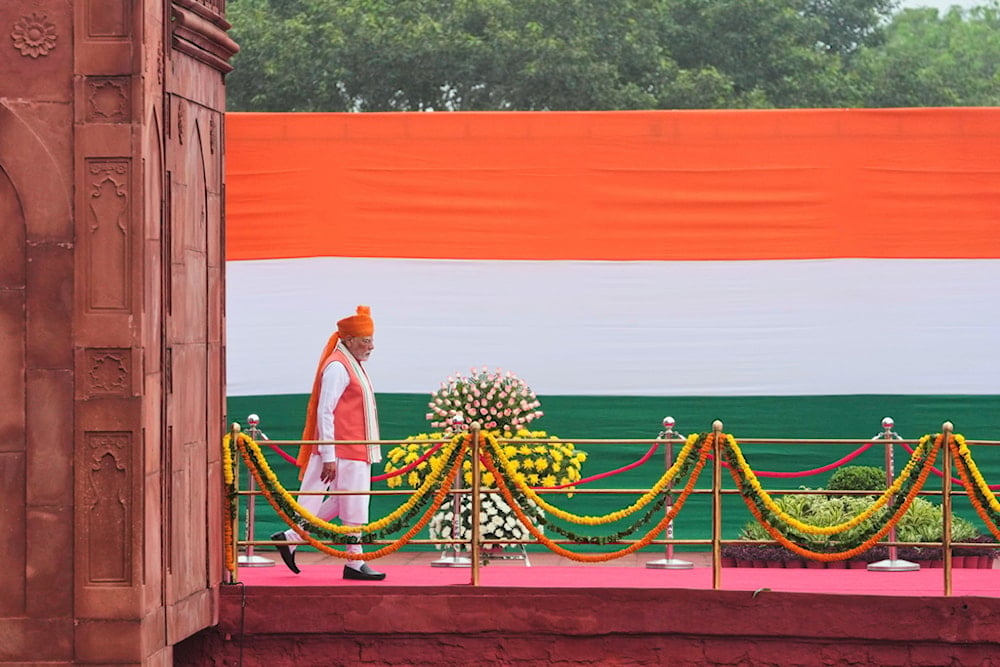Modi to visit China for first time since 2018 to attend SCO summit
Indian Prime Minister Narendra Modi will travel to China at the end of August to attend the Shanghai Cooperation Organization summit in Tianjin, marking his first visit since 2018.
-

Indian Prime Minister Narendra Modi arrives to address the nation from the rampart of the 17th century Mughal-era Red Fort monument during the country's Independence Day celebrations in New Delhi, India, Friday, Aug. 15, 2025. (AP Photo/Manish Swarup)
Indian Prime Minister Narendra Modi is preparing to travel to China later this month, National Security Advisor Ajit Doval confirmed on Tuesday during discussions in New Delhi with Chinese Foreign Minister Wang Yi.
Doval said Modi will take part in the Shanghai Cooperation Organization summit, scheduled to open on August 31 in Tianjin, marking the Indian leader's first visit to China since 2018. "Our prime minister will be visiting for the SCO summit," Doval stated, noting what he described as "new energy" in bilateral relations.
For his part, Wang Yi expressed Beijing's expectations for the trip. According to an official translator, Wang said China "attaches great importance" to Modi's participation in the SCO gathering. "History and reality proves once again that a healthy and stable China-India relationship serves the fundamental and long term interests of both of our countries."
Wang was also scheduled to meet Modi directly later in the day.
Strategic rivalry
The visit comes against a difficult backdrop. India and China remain fierce competitors for influence across South Asia. Relations soured dramatically after the 2020 Galwan Valley clash, when troops on both sides were killed in the most violent border confrontation in decades. Although several rounds of corps-commander talks have since achieved limited disengagement, the Line of Actual Control remains unsettled, with tens of thousands of soldiers still deployed in forward areas.
Meanwhile, New Delhi has tightened its economic stance toward Beijing, banning dozens of Chinese apps and imposing restrictions on investment flows under the Press Note 3 FDI rule, which requires government screening for investments from countries sharing a land border with India. These measures remain in place, reflecting how security concerns continue to dominate the relationship.
Economic pressure
Despite tensions, trade between the two Asian giants has remained significant. Now, global turbulence has created fresh incentives to recalibrate ties. The US tariff wars under President Donald Trump, revived again in 2025, have disrupted supply chains and pressured both countries to hedge. For India, which is seeking to expand its export base, and for China, which faces mounting restrictions from Washington, selective cooperation offers a way to offset external shocks.
India's role in the Quad alliance with the United States, Australia, and Japan positions it firmly within a network often described as countering Beijing's rise. Yet forums like the SCO give New Delhi room to balance, engage, and explore pragmatic avenues with China. During talks on Monday with India's External Affairs Minister Subrahmanyam Jaishankar, Wang Yi suggested both sides reframe their approach: the two nations, he said, should "view each other as partners and opportunities, rather than adversaries or threats."
Read more: India calls for lasting resolution to China border row at SCO summit
Analysts expect Modi's participation in Tianjin to focus less on dramatic breakthroughs and more on symbolic signaling. Possible areas of discussion include confidence-building steps along the border, trade facilitation in critical inputs, and coordination within the SCO framework.

 3 Min Read
3 Min Read










